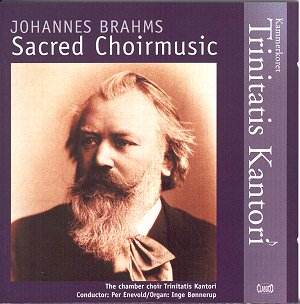One of the most rewarding things about Brahms
is how much wonderful music he wrote. As with any prolific composer,
he is known by only a small proportion of his output, yet it seems
that everything he wrote deserves the accolade 'masterpiece'.
At any rate this imaginative programme exploring his sacred choral
music, interspersed with some late organ preludes, extends our
awareness of the Brahms repertoire and is a most rewarding disc.
The organ preludes are thoughtfully played by
the Danish organist Inge Bínnerup, and they make an ideal
foil to the sophisticated and varied choral textures which surround
them. As such the programme works well as a quasi-concert experience,
one item leading to the next with a pleasing shape and balance.
These organ pieces are deeply thoughtful meditations, and prove
just right in these sensitively recorded performances.
The sacred choral music receives the prime billing
on the disc, and rightly so. For here are several masterly and
substantial works, some a cappella, some accompanied by the organ.
The Trinitatis Kantorai perform the music with dedication and
distinction, and the acoustic is most pleasing. The recorded sound
affords both atmosphere and detail, and there are many opportunities
for the essential qualities of each piece to make their mark.
Brahms spent much of his career working with
choral ensembles, and he first developed his relationship with
Vienna from this connection. The works assembled here have many
interesting relationships with the details of his life, and this
adds to the value of the collection. For example the Fest-
und Gedenkspruche (Festival and Memorial Sentences) were dedicated
to the Mayor of Hamburg when Brahms was awarded the Freedom of
the City in 1890. These three movements explore a wide expressive
range and develop a nationalist theme, as if Brahms sought an
opportunity to celebrate the achievement of a greater German state.
Brahms's motets are a particularly rewarding
area of study. They vary considerable from one to another, for
example, and this is reflected in this programme. Schaffe in
mir Gott, Opus 29 No. 2 is a single movement of seven minutes
duration, while Warum ist das Licht has four movements
extending across some twelve minutes. The latter is a wonderful
piece, and it receives a particularly pleasing performance here.
It is also a reflection of the composer's reverence for his German
predecessors, and inspired by the Lutheran tradition. The music
reworks material from earlier in Brahms's career, and uses the
choral groupings with much imagination, sometimes concentrating,
for example, on the upper voices so that the basses can make a
really rich effect in the closing statement, such as in the second
movement, 'Let us lift up our hearts'. The final movement is a
tribute to Bach, a subtle chorale in four parts.
While the performances and recording on this
issue deserve high praise, the accompanying booklet and general
presentation do not. For a start there is no clear listing of
the items programmed. Rather the back of the disc has tiny while
lettering on a purple and brown background, and there is also
the problem of light reflection through the plastic case. Inside
there are full texts and translations and some brief though useful
notes, but again in tiny print. This small font size is the more
galling because so much space is lost to pointless design features.
However, to concentrate on the inadequacies of
printed presentation, at the expense of the excellence of the
performances and recorded sound, is to put the cart before the
horse. For this disc will give much pleasure and performs the
worthy function of bringing some marvellous and little known music
to a wider public.
Terry Barfoot
